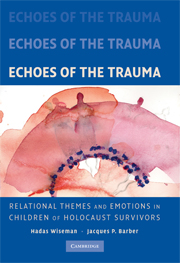Book contents
- Frontmatter
- Contents
- Foreword by Dan Bar-On
- Preface
- Acknowledgments
- 1 Introduction – A Narrative Approach to Bridging the Gap between Clinical Case Studies and Empirical Research on Children of Holocaust Survivors
- 2 Studying Relationship Narratives with the Core Conflictual Relationship Theme Method
- PART ONE RELATIONAL THEMES IN THE NARRATIVES
- PART TWO EMOTIONS IN THE NARRATIVES
- PART THREE HEALING TRAUMA IN THE CHAIN OF THE GENERATIONS
- Appendix
- References
- Index
1 - Introduction – A Narrative Approach to Bridging the Gap between Clinical Case Studies and Empirical Research on Children of Holocaust Survivors
Published online by Cambridge University Press: 29 July 2009
- Frontmatter
- Contents
- Foreword by Dan Bar-On
- Preface
- Acknowledgments
- 1 Introduction – A Narrative Approach to Bridging the Gap between Clinical Case Studies and Empirical Research on Children of Holocaust Survivors
- 2 Studying Relationship Narratives with the Core Conflictual Relationship Theme Method
- PART ONE RELATIONAL THEMES IN THE NARRATIVES
- PART TWO EMOTIONS IN THE NARRATIVES
- PART THREE HEALING TRAUMA IN THE CHAIN OF THE GENERATIONS
- Appendix
- References
- Index
Summary
CHILDREN OF HOLOCAUST SURVIVORS – THE “SECOND GENERATION”
The term “second generation” has become an accepted shorthand phrase that refers to adult children of Holocaust survivors. The term has not only been part of the professional literature, but it has also made its way into music, film, literature, and other arts (Solomon, 1998). In North America, as in Israel, children of survivors define themselves as a group of adults who share certain issues in common due to being the sons and daughters of surviving parents and have formed self-help groups.
In Israel, until the 1990s the term “child of Holocaust survivors” was an ambivalent one. It was assumed that identifying oneself as having parents who were Holocaust survivors suggested that their trauma had been transmitted from them to their children. That is, children brought up in families of survivors were affected by the parents' trauma, which attested to negative psychopathological consequences. Statements such as “I am not from a typical family of survivors” or “I never considered myself as a child of survivors” or “the Holocaust has not affected my upbringing in any way” attest to the emotionally laden nature of the term and to the need to define oneself as free from the psychopathological consequences that this term may imply. For some sons and daughters of families of survivors the very fact of having parents who suffered the Holocaust has been downplayed or not acknowledged at all by the parents or by themselves.
- Type
- Chapter
- Information
- Echoes of the TraumaRelational Themes and Emotions in Children of Holocaust Survivors, pp. 1 - 12Publisher: Cambridge University PressPrint publication year: 2008



